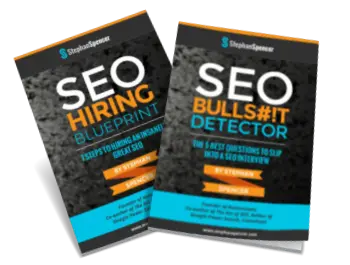On-Page vs Off-Page SEO
Hello, everyone. I am here today with Stephan Spencer, and he is an internationally recognized SEO expert and best-selling author. He is also the co-author of The Art of SEO, author of Google Power Search, and co-author of Social E-Commerce Edition. All published by O’Reilly. The Art of SEO, now in its third edition and weighing in at nearly 1,000 pages, is considered the Bible of search engine optimization and boasts testimonials from such industry giants as Seth Godin and Tony Hsieh and is even used as a textbook at universities. Stephan, how are you doing today?
I’m doing great. Thanks for having me on.
Awesome. And today, we’re going to talk about what on-page and off-page SEO means with today’s search engine algorithms and traffic. And I personally am super interested in talking about this and learning from you. The industry giant with Stephan about all this because there’s a lot of confusion about what SEO means in today’s world based on what it used to do and based on what it means now, and we’ll have to get a lot of stuff cleared up by Stephan.
Stephan, to get things kicked off on some basics here, can you talk about what the basics every company needs to concentrate on for on-page SEO are? First, let’s define what goes in the on-page bucket versus what goes in the off-page bucket because this might be unfamiliar terminology for the listener.
So, on-page refers to anything that would be on the page in the code, in the HTML, and on the rendered page. That affects the page in question, whereas off-page would include things that are on other pages of the website or other websites altogether or signals that Google pays attention to that are not just directly on the web but perhaps in the domain that is recorded or just kind of a historical rap sheet that they might keep on you and past infractions and spammy behavior.
There are a lot of ways more off-page factors to think about than on-page. Over time, the off-page stuff, I think, is becoming more difficult and elusive for the marketer to figure out and master. Okay. It’s easy to think of the fact that, oh, this is an off-page factor, but. It’s going to be more elusive to even know what those off-page factors are, as we’re becoming more driven by machine intelligence, you know, machine learning.
Artificial intelligence is becoming a bigger and bigger part of the Google algorithm, and this is going to make, you know, SEO and just the Google algorithm all together just a black box where I have a really hard time even knowing what the signals are. Now we do. Now we have a general idea of what many of the signals are because machine learning and the rank brain algorithm are what they’re using for machine learning right now, and the algorithm accounts for maybe 15%.
All searches from what Google engineers are saying, but that’s going to ramp up over time. This is going to get really dicey to try and master SEO if you’re not on the top of your game. Let me get back to the original question on the page.
Real quick, can you describe what some of those off-page signals are before we get into the on-page stuff?
If somebody links to you, that’s essentially like a vote. However, not all votes are created equal, so a link from CNN.com is going to be worth a lot more than a link from Jim Bobb’s personal home page. So you’re looking for quality links. And what do I mean by quality? It’s essentially the ideally relevant to your industry.
They are important as far as Google is concerned, authoritative and trusted. And then the placement of the links matters. If it’s a footer link, it’s not as valuable as if it’s in the main body of the page. If it’s a site wide link, then it’s not as valuable as a link that’s just on the home page because it looks like there’s some commercial relationship going on between you and the linking website.
So, those are just a handful of link-related factors. And, of course, the anchor text that is used to underline words. In other words, click here is not great anchor text because those words get associated with your page instead of something relevant to your industry or business.
Product, right? And yet, you don’t want to go over the top with this and get really keyword-stuffed links that look artificial. For example, a whole bunch of people linking to you with a used car in San Diego when you have a car lot called Mr. Joe’s car lot just does not look legit to Google, and you’ll get penalized for that.
It has to look natural. It should be natural, not just look natural, because the machine learning algorithms are getting better and better at sniffing out the artificial stuff. So, those are some link-related signals. And awesome placement of other text near the link, right? So if there’s good keyword-rich content that’s valuable near your link, the link that’s pointing to your site.
That’s helpful if there’s a bunch of spammy stuff, like other links to sites that are things like Viagra and payday loan type links are adjacent to the link to your site. That doesn’t look good. So lots of link-related signals. And then, related to, let’s say, your domain, how about the registration date, the age of the domain, how about the age of the website?
So, the domain and the website are of two different ages. You might have sat on that domain for 10 years and not launched anything on it, just might have been a parking page or not resolving. The clock really starts when the website starts not when the domain gets registered nearly as much.
So you go into WaybackMachineArchive.org, and you see how old your site is. Other domain-related signals are like the number of years that you’ve paid for your registration. Your domain registration, if it’s only a new domain and it’s only been registered for a year, that doesn’t look as legit as a domain that’s 10 years old, and then you’ve registered it for the next, you 10 years or 5 years, whatever, so that it looks like you’re serious, you’re not a fly by night.
Those are some examples of domain-related signals. There are plenty of others, and Matt Cutts once famously said that whether the webmaster owned a cat or not returned better search results, they would use that in the algorithm. They’re constantly testing all sorts of different signals to see if they improve. The search results detract from them.

Links, content, and RankBrain are the three most important signals in the Google algorithm.
Gotcha. So it’s an ever-moving target. There is lots and lots of stuff to consider. Now, I actually came across a conversation the other day. It was an SEO company, and they were looking to place a value on one of those super-high-quality linkbacks, like CNN or some other Forbes and some other big ones. Is there a value or an approximate value placed on something like that?
Well, you would measure its value, not monetary value, but the amount of juice that’s being transferred through that link. This is an approximation because we don’t have access to the Google algorithm and the page rank scores, the real ones, the internal ones. We used to get K Trank scores through the Google toolbar, which was kind of a joke.
We all knew inside the SEO community not to pay attention to those. But we don’t have any insight into the real PageRank algorithm and scores. It’s all hidden within the Googleplex. We can use some different tools that approximate PageRank, such as well, there’s Open Site Explorer from Moz and their metrics for estimating the page rank score include Moz rank, page authority and domain authority.
They also have Moz trust, which approximates trust rank, which we can talk about if you’d like, but it gets a little geeky. There’s also Majestic.com, which is a tool that is running a different algorithm and has a different crawl of the web. So, I believe in Looking for corroborating evidence using multiple tools, use Open Site Explorer and use Majestic to see if a trend or some data point is real.
So, Majestic, two metrics to pay attention to are citation flow, which is their approximation page, rank and trust flow or their approximation of trust rank. And then there’s Ahrefs.com and Link Research Tools. They have Kemper Power, Kemper Trust, and Kemper Power Trust.
So, there are a lot of different tools that you could use to estimate, “Hey, drink. I use all of ’em. At least have two that you use regularly.” And some of these tools you can still put on a website even if you don’t. You put in the URL, even if you haven’t logged in. You’ll get maybe three queries a day, which is allowed.
So, it’s best if you just pay for the service, but even if you don’t have the budget at the moment, you can get some value out of these tools. It’s just not nearly as much.
Is there any way to put a monetary value on it? If somebody, if an SEO company was coming to somebody and said, “Hey, we’re going to get you a link back from this high-quality site.”
No, in fact, I would say that’s folly. To put monetary value. You can’t possibly do that because once you look at an individual link and the score might check out, but then you see that a bunch of the links on the page are really sketchy, links to Viagra, payday loan, all these really sketchy links that completely, man-validates the power of the link though you have on that page.
I hear you. And then that’s where I just was like wondering. I was like, how can I do this? It really just comes down to. You’ve got to get with, if you’re going to be concentrating on your, you know, like an SEO company, you know, that’s going to be getting you, you know, link juice. It really just comes down to the repute, reputable companies, and you’ve got to find a good company because there’s this, there are so many things that you can fool somebody with, it sounds like, even if it’s saying getting from a Forbes.com what that might not mean what it used to mean, or it doesn’t mean what it used to mean.
Yeah.
That’s interesting. I felt that, but I didn’t know it, you know? I just thought that it sounded weird.
Yeah, so here’s the thing that I would recommend you do to make sure you’re getting a good SEO from. I have two different documents that are free on my website StephanSpencer.com. One is in the resources guides and white paper section. Mouse over resources and pick guides and white papers. The first document is an SEO Hiring Blueprint, and the second one is an SEO BS Detector. I won’t say what BS stands for.
But you know what it means. This is a clean podcast, right? The idea here, though, is you need a road map. Maybe it’s not a clean podcast. The roadmap that you get from that SEO Hiring Blueprint you just follow to ensure that you get really qualified candidates, whether they’re in-house SEO people that you’re looking to hire or they’re an agency you’re looking to hire or people An individual consultant like me I’m pretty much an individual consultant.
I have a small team that helps support me in writing reports for my clients and so forth. But I’m doing the bulk of the work. The second document, the SEO BS Detector, has some trick questions. One stage in the seven-stage process in my SEO Hiring Blueprint is to introduce trick questions into the interview process.
And these are not as obvious as trick questions. You’re just asking things that you already know there’s only one right answer to. And it just sounds like an innocent question that somebody might ask. You might slip into the interview when you’re asking about things like, okay, what’s your process for doing on-page SEO? I realized we never circled back to on-page stuff, but what are some of your strategies and tactics for on-page stuff for optimizing things on the page, like titles and so forth, then you might slip in as the trick question and tell me what the process is for optimizing meta keywords.

On-page SEO refers to anything that would be on the page in the code, in the HTML, and on the rendered page.
How does that work? And the only right answer. Are meta keywords? Are you serious? Those, you know, those never counted in Google. That’s the only right answer. Because if they said, well, they don’t count as much as they used to, but it’s still not a bad thing to do it. That’s a completely bogus answer. Because they never counted in Google.
And if you don’t believe me, just Google it. Type in. This is on the Google Webmaster Central blog back in 2009 or something. They said we never counted meta keywords in our algorithm. They never counted. They were never a positive ranking signal. If somebody says anything to the contrary, you know they don’t know their stuff, and that’s a great time to say, “You know, we’re done with the interview, but I appreciate your time. Here’s the door.” So, you’ve got to be very careful.
You’re telling people about those to save people a ton of grief, money, and time, so I’m so happy to hear that you’ve come up with something like that. Because I think you’re really doing something, you know, doing a service to the world and the industry out there. That’s awesome. And just to just to direct people correctly, it’s Stephanspencer.com, that’s STEPHANSPENCER.com. Stephon Spencer.
Correct. Okay. Yeah. And there’s a ton of other stuff on there, too. That, you know, like, probably hundreds. I’m not counting them all, but probably hundreds of articles. I’ve written for Search Engine Land for many years. So, there are links to tons of those articles. I’ve written for Multichannel Merchant and just a bunch of different sites, such as Huffington Post, etc. Then, there are some other white papers and downloadable PDFs. There are archived webinars and YouTube videos, interviews, and all sorts of stuff, and I have two podcast shows that people should definitely check out.
There are links to both shows from stephanspencer.com, but you could go directly to Marketingspeak.com for the Marketing Speak podcast, which is all about Internet marketing stuff like Facebook advertising and SEO, of course. Conversion optimization, you name it. And I’ve interviewed some really great guests. I interviewed Jay Abraham recently, for example, on Marketing Speak. The other one is called Get Yourself Optimized, which is kind of a funny name. That’s all about self-development and personal transformation; even though it sounds like it’s all about optimizing SEO, it’s optimizing yourself.
No. I’ve learned a couple of those. They’re really good.
Oh yeah. Thank you. I’ve got some great episodes on there, like Harville Hendrix, author of Getting the Love You Want. He’s been on Oprah, Phil Town and stuff. He is one of the top financial gurus in the world. He wrote two number one New York Times bestsellers, and he’s talking about how to invest in the stock market and not lose money.
It’s just like, there’s some great episodes, all these biohacking episodes as well. I’m going to interview Dave Asprey next month, who’s the Bulletproof Executive and creator of Bulletproof Diet, which is a New York Times bestseller, and Bulletproof Coffee, which is his invention. Yeah, great stuff, so check out those two podcasts as well.
Awesome. Now, obviously, I think a lot of people are going to be running over there to learn a lot, but to kind of just dig into some of the, just circling back to the original question, what are just some of the basics, every company, just getting started?
Okay, here are the Two, four, five, and ten things that you just need to do right away; what would those be?
Yeah, one of the most important things to look at on a page is the title tag. It’s the most important signal as far as the on-page signals are concerned. And it’s not something that is oftentimes paid attention to if you don’t know SEO.
So, a great way to see what your title tags look like is to type into Google. SITE:, and then your domain.com, whatever your domain is, and Magnificent.com, if you are updated, so SITE:Magnificent.com, or Toyota.com, or whatever your domain is, and then you’re going to see a whole bunch of search results from your site.
It can be up to 700 results, and you’re going to just scan through those to see how good they are. If they have good keyword phrases, if they are compelling enough to compel you to click or if they’re just pretty much useless, welcome to our website, untitled document. Those would be really lousy title tags, and chances are you probably don’t have fantastic title tags.
That’s the first thing you’d want to fix across your site. If you have a large site, you’ll want to start with the top of the site tree, your home page, and secondary-level pages, then move on to the tertiary-level pages and the quaternary-level pages and go as far as you can with the time that you have available.
That’s going to be a great return on investment for on-page work. There are a lot of other things that you could spend your time on.
What was it again? Site?
SITE: and then domain.com, whatever that domain is, whatever your website URL is. Okay. Don’t put a space after the colon because that will break the operator and won’t work right.
So, SITE:magnificent.com, for you guys would return a whole bunch of pages from the magnificent.com website. And then you just scan through looking at those and you see, oh yeah, these look really bad. I need to work on these. And if you’re running a WordPress-based website, you could either use a plug-in that I created over five years ago.
It’s called SEO Title Tag. It allows you to mass edit all sorts of posts, pages, tag pages, category pages, and pretty much anything on your WordPress site through a mass edit interface like this. You can edit dozens or hundreds of pages at a time without going to each page individually, editing it, saving it, and then going back and doing it to the next one.
You want it all on one page, so that’s a mass edit interface. Or Yoast, with its SEO plug-in, basically copied that functionality and put it into its plug-in as well. So, if you’re using Yoast, you can just. Then, you can just go through a whole bunch of pages, posts, and so forth.
And what are you looking for when you’re going through these pages? I’m just doing it right now as we’re doing it. So what are we looking for? Are you looking for the descriptions underneath the pages, or what exactly should one, you know, be paying attention to?
The most important thing is the title, and then the meta description is not something that influences your search rankings in Google, so you’re not going to. Don’t worry about that.
That’s a second-order activity if you have extra time. Work on the things that are really a good use of your time so that will move the needle, right? So if I were to put in, I’d put it in right now, say colon magnificent.com, and I’ll pick an example of one of your pages.
You can be harsh.
Okay. All right. So, directory listings. Magnificent Marketing, LLC. Well, if you’re trying to rank for directory listings, that is okay, but that doesn’t compel me to click for one thing. If I saw that in the search results, I would have zero interest in clicking on that. And secondly, you’ve got to think about what are.
The keywords that you really want to rank for, such as directory listings, are not really good anymore. Ten years ago, when people were still talking about getting directory listings for SEO, that might have been useful. Another example of a title tag is your team, Magnificent Marketing, LLC.
Well, what kind of team is it? Is it your team of marketing specialists at Magnificent? That would be a better title tag if you’re trying to rank for a marketing-related keyword. So sales, marketing strategy, branding—these are all keywords that you guys probably want to rank for, and you’ve got specialization expertise in.
None of those keywords are represented in the title tag. It just says, Your Team, Magnificent Marketing, LLC. So the marketing is in there, I guess, as part of your name, but that’s a boilerplate in every single one of your titles. It’s just your company name. It’s not as good as having a keyword-rich phrase, but remember, Google is now smarter than they were 10 years ago.
It’s not about the exact match phrase. It’s about entities and you know, other corroborating signals that help Google figure out, yeah, you really are marketing experts or strategy experts. But at the time of day, it’s a great place to start.
And you’re looking at, like, what actually, the top part of it right there, like your team content technology plus marketing services, correct?
And this is another good point: If Google is using a Title that is different from your title tag, that means that they’ve overridden your title for whatever reason. Perhaps it looks too keyword-stuffed. Actually, that’s a good point. I didn’t go to the page itself. I just saw the title that Google was displaying.
They overrode your title. Your title tag, according to Google, says your team is Magnificent Marketing LLC. I clicked, and then I saw that your title was actually different, and this is happening more and more these days. You guys have a title that says your team is Content Technology and Marketing Services, Austin, Texas.
If Google is basically hijacking your title, try making it more value-added and less keyword-stuffed and see if Google starts using your title instead. It’s hard to know why exactly Google is overwriting your title tag with theirs, but you don’t want to just accept that.
You want to work to improve your title until yours is the one that gets represented in the search results. So that’s a good point that I didn’t make until you brought it up.
Okay. All right. What are some other things? I mean, that’s a great starting point there. What are some other basics, you know, right away before? Digging into all the minutia. What are some of the other things people, just a checklist of, you know, do this, and this?
Yeah, this is going to get geeky. We’ll start with the easy stuff. The title tag is really easy. Of course, you want to do some keyword research, use the Google AdWords Keyword Planner, etc.
You need an AdWords account to use the tool. But you don’t have to spend money with AdWords. You just have to sign up and give your credit card details, and then you can start using the tool. It won’t be dinging your credit card. Don’t start any campaigns you didn’t mean to in AdWords.
So, once you’ve identified some good keywords to target and incorporated some of those into the tool, such as the appropriate pages on the site, you’re not going to keyword stuff. You’re not going to use the same keyword phrase across all pages of your site. You’re going to pick a page that’s highly relevant to that keyword theme, and then you’re going to put that into the title.
You’ll also put that in the body copy. The concept of keyword prominence is important to grasp here because it’s not about the number of occurrences, otherwise known as keyword density; it’s about the placement of that keyword phrase. So, if it’s at the top of the page, it’s worth more than if it’s at the bottom of a 3,000-word page.

It’s not about keyword density anymore; it’s about keyword prominence and placement.
Just think about, like, am I putting my best foot forward here with this page in terms of what I’m trying to present as my keyword focus or keyword theme? So keyword prominence is a really important concept. And now we’re going to get geeky because you’re going to have to think about what’s happening behind the scenes in the HTML, such as Schema.org.
That’s also known as microdata markup. You make sure, like, if you have a video embedded on the page, that you’re using a schema.org video object or a Facebook share format or RDFA. So you’ve got that. You know, geeky stuff going on behind the scenes, depending on what kind of page type we’re talking about.
If it’s a product page, then you’ve got offer markup, schema.org offer markup, and so forth because you want rich snippets to appear in the search results for your listings, right? Do you want, for example, if you have customer reviews? You want a star rating in your listing on Google. You want it to say the number of reviews that are associated with that product page.
If you have stock availability on your page, in stock or out of stock, you want that displayed in the Google listing. You want your pricing. If the product is 32, you want that to show up in the search result. That’s all done with schema. org markup, and that’s something that if you’re not Make sure that you’re doing it or not.
You could use a tool called the Google Structure Data Testing Tool to see if this is in place and if it’s in place correctly. And then there’s other stuff that you’re going to have to watch out for, configuration type stuff. Things like, is there a meta robots tag that’s a no index.
A directive that’s causing a page not to show up in the search results or the robots. txt disallow directive blocking that page from being spidered by Google. You know, there are tons of things to look out for. Just configuration-wise, you want to make sure that your error pages are working properly, so you return a 404 if it’s a 404 type of page.
You want a 404 status code return. So you’re going to have to use a server header checker to test that. And there are a bunch of free ones online. Just Google it, server header checker. Put in a URL of a page that shouldn’t exist, like magnificent.com/ASDFASDF. Right? Something nonsensical like that from your site, and make sure that the server header checker returns a 404 status code.
It’s not good enough that the page says, “Oops, nothing here, sorry.” And then, you know, a nice pretty looking custom error page that actually has to return a 404 status code. I could go on and on with hours and hours of all sorts of geeky configuration things that you need to do, like if you have a mobile site and blah, blah, blah. But I know. We have only limited time in our episode, that’s probably a good starting point.
Okay. Well, thank you. Personally, too. We’re going to be relistening this and going back and applying all this stuff and then heading over to your site and learning from you there as well.
Okay, moving on a little bit. I know there’s a lot of confusion in the marketplace these days on linkbacks. You know, you have, you know, you have your traditional, you know, SEO companies that say it’s all about links. It’s all about links. And at the end of the day, you know, Yeah, I mean, you know, with the social signals and, you know, everything else in play, on pay, you know, on your dwell time, on the side, how long people stay on the page, and all that plays into factors, but you still do have, you know, I mean, I get emails daily with SEO companies talking about link backs, right?
I would just like for you to explain how this works in today’s world. You know, you could tow the line between gray and black hat with people saying, I’m going to build links for you. So can you talk about how important, you know, this kind of stuff is still, you know, important for traffic and rankings and everything versus, you know, what is somebody, what is a good SEO company really should be doing for you in regards to, you know, the talk of links?
So, if you think about this as a commodity-type situation, you’re getting it all wrong. It’s not about getting a certain number of links but certain metrics associated with those links, like Moz rank or domain authority or page authority of the linking site or page. That’s not a useful way to think about it.
It’s much better to consent. And I’ll preface this by saying that links are still the most important signal. The Google algorithm, according to Google engineers, has the three most important signals, and this is recently circulating around SEO news sites like Search Engine Land and, you know, SEM posts. The three things are links, content, and rank brain.
Those are the three most important signals that Google uses. Brain. And links is that. Yeah, Rank Brain is the machine learning algorithm we talked about a little bit ago. Those are the three things. And there are plenty of other signals, hundreds of other signals, but those are the top three links at the very top of the list.
So this is important. We can’t just not worry about it and expect it to take care of itself. But to think of this as a commodity would be a big mistake. So it’s about. Being remarkable with your online marketing and as a way to get the attention of influencers, the linkerati, in other words, will link to you from their blogs and websites that have lots of authority, trust, and importance in the eyes of Google. And that’s where you get all that juice.
How does one go about getting that?
How do you go about being remarkable and then getting all those great links? First of all, you have to think differently about what you’re creating, whether it’s it doesn’t matter what your industry is. It could be as boring as you’re selling.
Toilet seat lids or plumbing supplies doesn’t matter because you can still think outside the box and come up with crazy, brilliant ideas for content marketing pieces, right? So, if I were selling plumbing supplies, I might think of a compilation type of blog post of the 50 craziest urinals from around the world.
And all I have to do is I don’t have to go travel the world and take pictures. I just go on to Flickr and Google images and so forth and just type in the word urinal and find the best images that are creative commons license that I can reuse those and then create a compilation. blog post of funniest, craziest urinals, and now I have a tangentially related to my business blog post that has potentially viral appeal.
I’m just going to keep doing this, upping my game, and getting better at it as time goes on. So, I might start doing listicles instead. I might then move on to infographics and use a free or inexpensive tool like PiktoChart to create them, or I might get my to create infographics for me.
I might create personality tests or quizzes, and so there are so many things that you could do: checklists, worksheets, buyer’s guides, how-tos, comics, viral videos, you name it, that would potentially be remarkable if you think of a clever hook or angle, and then you pay attention to the headline.
A really killer headline is going to be critical. And you’ve probably seen the personality test in your Facebook news feed, which city you should live in. And that did really well. It spread virally. And by the way, the social signals are not what we’re after. We’re after the links because social signals are not included in those three things, right?
It’s not a signal that Google is paying a lot of attention to. The shares and retweets and likes and plus ones and all that. That’s not the end game. The end game is the links because we’re after the links. Spreading virally through social media, getting the attention of the Linkarati, and they’re like, “Oh, that is so cool, I’ve got to write about that on my blog.”
That’s the endgame. And if we’ve got a really killer headline, like, Which city should you actually live in? And you notice that the word Actually made that headline, right? What city should you live in quiz doesn’t do it at all. It’s just another Me Too type of survey. That’s the end. That actually presupposes that you’re not living in the city that best suits you, so pay attention to the headline.
So you can repackage your idea and the hook that you’ve come up with. Into different formats, right? Let’s say that you have this idea for an infographic about the different hand gestures and what they mean in different parts of the world. Some things don’t mean nice things depending on the country you’re in, like an okay is not okay, or a thumbs up means up yours depending on which country you’re in.
So, an infographic would be a great starting point for conveying that information. It would be a lot of fun, right? And graphical. You could also use a viral video that would be a lot of fun, and you’re like, “Oh, I’m not going to send a video team around the world to take videos of what these things mean in different parts of the world.”
Well, just go on to Fiverr.com. Pay somebody five bucks in that country to go and video themselves, given the thumbs up or whatever, you know, the up yours or whatever that means in that country and see what the reactions are and then take the best of those videos and create a compilation, add your narration and say, you know, Oh, Add some animation and stuff to it and have an educational viral video about what these different hand gestures mean in different parts of the world and how to avoid getting shot.
And you could just keep repackaging these things in different formats, like a personality test or quiz. You can have a quiz that will get you shot as a world traveler, yes or no, out of taking the quiz. Then you try to guess whether this is an okay thing to do as a hand gesture like the V for victory signals, which is very vulgar in certain countries.
You wouldn’t necessarily know which countries you can use it and which you cannot. You can have this fun quiz, and then it gives you a score at the end. Then there’s a badge that you can probably display on your social media profile or your blog sidebar, saying whether you get shot or not as a world traveler or what.
I don’t know how many bullet wounds you get, but whatever, right? So I’m just making this up, but the idea here is to think differently, think outside the box, and create something that potentially has a viral appeal. Even if it’s just tangentially related, that’s okay. This is not designed for your customers. This is designed for the Linkarati.
Right, just like Caterpillar, Cat, they make big, you know, earth-moving machines. They made this incredible viral video, a massive Jenga game. The Jenga game. They used huge, one-ton blocks and earth-moving equipment to create the Jenga tower, which got millions of views, and then they eventually got the links.
Having various blog posts and PR initiatives wasn’t just to get links to the YouTube video on YouTube.com because that doesn’t help them directly. They want the links to their website, and they got them. They got lots of great links that did not target the customers at all. Nobody’s going to say, “I’m so glad I watched that video; now I’m definitely going to buy that that bulldozer.” I want to buy that game.
It sounds like more, and with SEO, content marketing is becoming a bigger factor for small and large companies, it sounds like. You know, to get these link backs, but then you just need to, I always, say, before we can invite guests over, you have to get your house in order.
So make sure you get all that on-page stuff done that you mentioned. And, you know, and listeners, again, can go to StephanSpencer.com to get all that stuff done. So that’s first and foremost. But then the plan moving forward is less about trying to, like, build links. And instead, it’s to create, you know, super compelling content that’s, you know, everything you’ve described above.

Your content doesn’t just need to look natural; it has to be natural to avoid penalties from Google’s advanced algorithms.
It could be funny, it could be humorous, it could be, you know, educational, it could just be just crazy off-the-cuff stuff. But yeah, it sounds like that’s the winning formula. Get everything on your site done correctly. Then, be remarkable with your content and get it out there to get these links back. Am I hearing that correctly?
Yes. And people are probably going to wonder, well, how the heck do I get it out there? I have very few fans, followers, or subscribers, and I can push it out on my social media channels, and it won’t make a darn bit of difference. The solution there is to use power users. I wrote an article for Search Engine Land a while ago called The Social Media Underground.
It goes through how to get power users in your hip pocket to utilize to push out your remarkable content into various social channels and get that kind of reach. Hopefully, the snowball effect will happen, right? The snowball starts small and rolls down the hill, but it gets big and really big fast. So, that’s the idea.
Now, besides power users, what else would you suggest? You know, obviously, that’ll take some time. What other suggestions do you have for getting in and getting out there?
Network with influencers. Let’s say if you’re a podcaster, you want to go to podcasting conferences and meet the top podcasters. Add value first and ask for favors later. So, the podcast movement is coming up in Chicago in July. PodFest just happened in Florida. So. Go to conferences, make friends, go to meetups and things where you’re going to meet other influencers, not just random meetups, but ones where influencers hang out. Use a tool that allows you to reach out to influencers and build prospect lists of influencers who have high cloud scores, high Mazda rank scores, et cetera.
Pitchbox.com is a great tool for that; not only does it do the prospecting and build the list for you of influencers. Per the topic that you’re working on, put in keywords, and then it builds that list for you, but also it will do the outreach for you. You pick some templates, or you upload your own templates, and then you can personalize the individual emails.
It also works like a mail merge sort of thing, but it’s got to seem like it’s an individually handcrafted email and not one of those, you know, bulk emails because that will get deleted immediately, and then it handles the follow-up. If they don’t respond after 10 days or 2 weeks, then you want to send them a follow-up.
So you can have a template for that and forward the original email. But ask for added value before you ask for a favor. So, if you have a column with the Huffington Post like I do, you could say, well, I’m working on an article of, you know, 15 things that, counterintuitive things about marketing that you need to know, and I wanted to interview you for that article or get at least a short quote or tip could I interview via email or by Skype for, you know, 5 minutes, 10 minutes, whatever and that’s a great way to add value first.
And then build the relationship so that you can ask for a favor later, like, Hey, I’m working on this e-book, and I’d love for your subscribers or readers to access this for free. You don’t start with that. You don’t walk up to a woman and say, “Hey, nice to meet you. Would you like to get married? That’s really creepy.” You add value first. If you start You know, it’s a low-impact thing and you kind of, over time build up to the ask.
Gotcha. Yeah, I mean, that’s all amazing stuff, Stephan. I just can’t thank you enough for sharing that. That’s amazing, and again, you know, everybody can go back to your site to learn more about, you know, all the specifics of everything.
To kind of close but move on. And I wanted to maybe just ask some specific questions; I came across just doing some research getting ready for this podcast, and just kind of have you answer some specifics here that just circling to end, but circling back around to on-page stuff some things I’m just very curious about as well. One came across a question: do you think bolding your keywords gives your page an SEO boost? Is that a misnomer? Is that true? Is that false?
That’s completely false. And if that’s the sort of mythology that you’re getting you need to run from that. SEO: Who’s telling you that stuff?
It was; it’s actually an SEO. I won’t mention the person’s name or anything. It’s just email that I, I’m just on their list, and I get it, and I thought these were some odd questions, so I wanted to say, “Oh, there’s a lot of mythology.” Yeah, I know, and that’s what’s so curious about this topic. I mean, of all marketing, I would say this is the most fuzzy understanding from people in the marketing world, and for sure the business world, because SEO, what does it even mean anymore these days, almost, it feels like, you know?
So, I came across these questions from them, and I’ve always had a raised eyebrow from them, and I haven’t, you know, I haven’t unfollowed them or unsubscribed because I’m always so curious because they’re such an old-school company. But that’s why I just wanted to bring these questions to you; I thought that they were great. So, you know, great in the sense of. Are they real? Right?
It’s definitely entertaining. And, by the way, I’ve collected and debunked a bunch of myths in a white paper, like a mini e-book. Again, here is a free document on my website, Stephanspencer.com, in the same area. Resources, guides, and white papers have called these SEO myths to die. And I list 72 myths like that and then debunk each one of them one by one.
Well, I will definitely link to that when I write this blog post. I will link to it and read every single one because that’s what we’re trying to clear up today.
And I think you’re doing a marvelous job at it and not to mention, you know, all the resources that will do that. So just a few more questions here, just out of curiosity are visits like to a website or page alone, a ranking factor at all?
No, if you think about it, Google is not hacking your Google Analytics or using that data.
They’re not they’re not watching your user behavior once they’re on your site. What they see is the click-through from search results. So if somebody comes back to the search results after being on your site for only a second and then picks the next search result, that’s an indicator that you did not answer their question or serve their needs.
So that’s what you’re looking for. It’s not in the Google Analytics reports, so time on site, bounce rate and all that sort of stuff. In fact, many of those metrics are not useful metrics. They’re not actionable. They are a waste of time in many senses, yet people keep talking about them as if they are valuable and useful.
I recently interviewed Jared Spool on MarketingSpeak. He said he is a world-class usability expert right up there with Jakob Nielsen. We had a whole discussion about metrics such as time on site, bounce rate, and even conversion rate and how these are just bunk. They’re not the right kind of metrics to base your business decisions on.
We talked about how to better handle user frustration and delight with different kinds of metrics, and that’s a must-listen-to episode. So, the bottom line here is to focus on the metrics that matter and are more related to user delight and user frustration, and not these other metrics that are the default metrics that you get from Google Analytics because those aren’t the ones that really are going to move the needle for your business if you work to improve them.
And most of those aren’t even used in the Google algorithm either. Right? So, just think about what Google sees the click from the search results, and then it can see if the user comes back and clicks somewhere else. So try and add value. It might be that adding value is answering their question quickly, and so they don’t spend a lot of time digging around on the page trying to find your answer.
The short answer is to get them in and out and realize that Google, over time, is going to understand that it’s not for that kind of query about the time on the page; it’s about answering the question quickly, and you did it. Their machine learning algorithms will figure that out and reward you for that even though they spent only a few seconds on your page to get the answer and then they left.
They didn’t end up clicking on another listing to get the answer. And RankBrain goes in there and sees that it basically interprets. I mean, I’m kind of hypothesizing into the future that they’re going to be able to do a heck of a lot more in terms of the artificial intelligence, but to be able to.
Ascertain that the question was answered correctly and effectively on your page versus just looking at other signals that point in the direction where the question was probably answered. Now, Google is going to be able to have artificial intelligence that knows you answered the question. I said computers are going to be smarter than us. And it’s in our lifetime, so it’s scary.
Yeah, it is. It is. But a little bit, what’s comforting with Google and Facebook and some of these, you know, quote-unquote big bag giants, and I’m doing air quotes, is that they really, their businesses are based around user experience, really.
You know, I mean, yeah, they’re in to make money, but they can’t make money if they have a faulty product. So they’re really in it to get, you know, get all the crappy ways of doing things and the manipulative ways of doing things. And they’re in it to make sure that what the users are expressing is the best way, the way that they’re, you know, Google and Facebook, and everybody is turning.
So, if you just pay attention to that, you know, that will lead naturally a lot. But you’ve got to pay attention to the details and, you know, everything we’ve discussed and everything that, you know, there’s still a lot to be looked into through a lot of your resources. But in general, though, they’re providing us with a service.
And I like them for it. So, one last question that comes up with a lot. At least, I hear it a lot. Domain extensions. Do they mean anything? Is there, you know dot coms work good? I mean, the best or, you know, you have all these new extensions coming out. Do they play a factor at all?
It’s not about the domain extension. You’re not trying to get links from dot edus and dot govs because of the extension. For example, what matters is the link profile and the link neighborhood that the site is in. Edu’s and gov’s tend to be better links pointing to your site because they have more pristine link neighborhoods.
A gov doesn’t have a lot of spammers hacking the site and getting, or getting, otherwise getting access to the site and dropping all their spammy links. They’re more trusted, and they’re in a more trusted neighborhood, but it’s just correlation; it’s not causation.
But what if you were starting to get a site and you were doing, getting a domain? Do you do dot co, dot com, dot net? Does it matter?
Yeah, the reason why is because that’s what users expect. That’s what, okay. There’s this Unspoken question that people have when they see anything other than a com: “Is this legit? Is this a real thing? Like a biz or a info or a ninja or guru?” Like, people look at that and say, really?
Okay. That’s what I mean. I did register. I didn’t know. I did register stephan.ninja for fun and stephan.guru. But I’m not putting those on my business card. So this is kind of ridiculous.
Get a dot com. And if any kind of permutation that you’re looking for is already taken, go to an aftermarket domain resource like buydomains.com, BUY, like purchase, buydomains.com or hugedomains.com.
Do some searches, do some keyword searches, and find some domains that are in your budget range. They’ve been around for a while. Most of the good domains, alt Nick heck, all the good domains are already taken, so you’re probably gonna have to buy an aftermarket domain, and you can buy ’em for as cheap as maybe 500 bucks, even a couple hundred bucks.
I bought scienceofseo.com five years ago, and I think I paid six 50 for that. I bought instar.com, INSTAR.com, a site that’s been around since the 90s, for 500; yeah, 500 bucks is what I paid for that. So, good deals are out there.
Yeah, we were lucky enough to score magnificent.com. That was kind of lucky. That is magnificent. Good job. Thank you. Well, hey, Stephan, I cannot thank you enough not only for creating an amazingly content-rich educational podcast and blog but on a personal level, you know, you gave us a lot of marching orders for our team, so we’re going to be digging into all this stuff.
So, thank you on both accounts. And again, just to reiterate, everybody can go to STEPHANSPENCER.com. We’ve mentioned a couple of them that you should specifically go and look at, such as the starting guide stuff and some of the myths.
Just a lot of great information. So I highly encourage everybody to run over there and keep learning from this guy because, you know, people, I say this kind of stuff a lot about a lot of people, but he truly is one of the very, very best in the business or else. People like Seth Rogan and Tony Hsieh wouldn’t be using it. So, Stephan, thank you so much for your time, and we look forward to doing another one with you soon.
All right. Sounds good. Thanks for having me.
All right. Thanks a lot.




